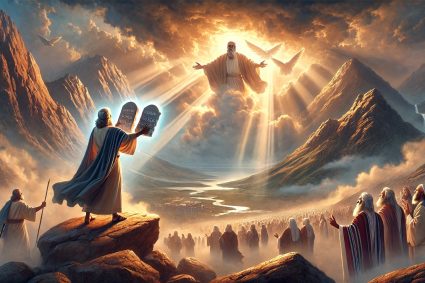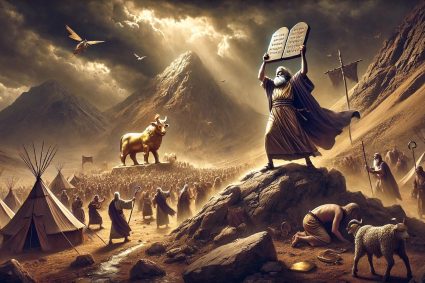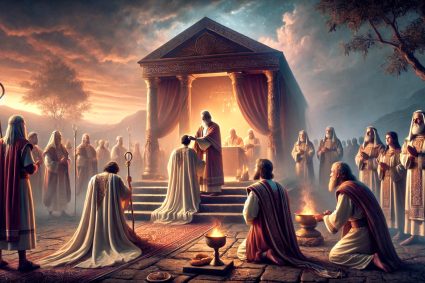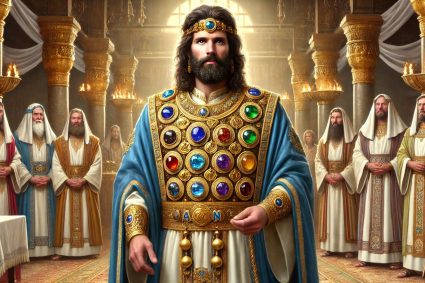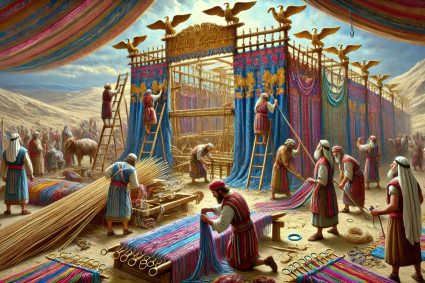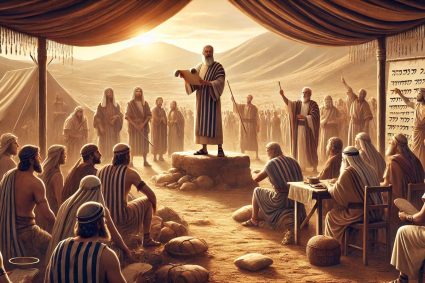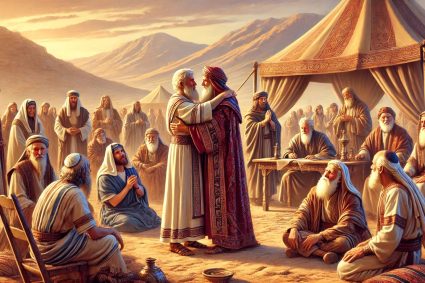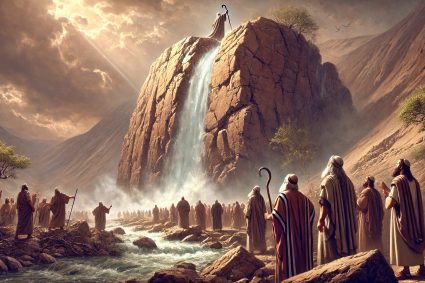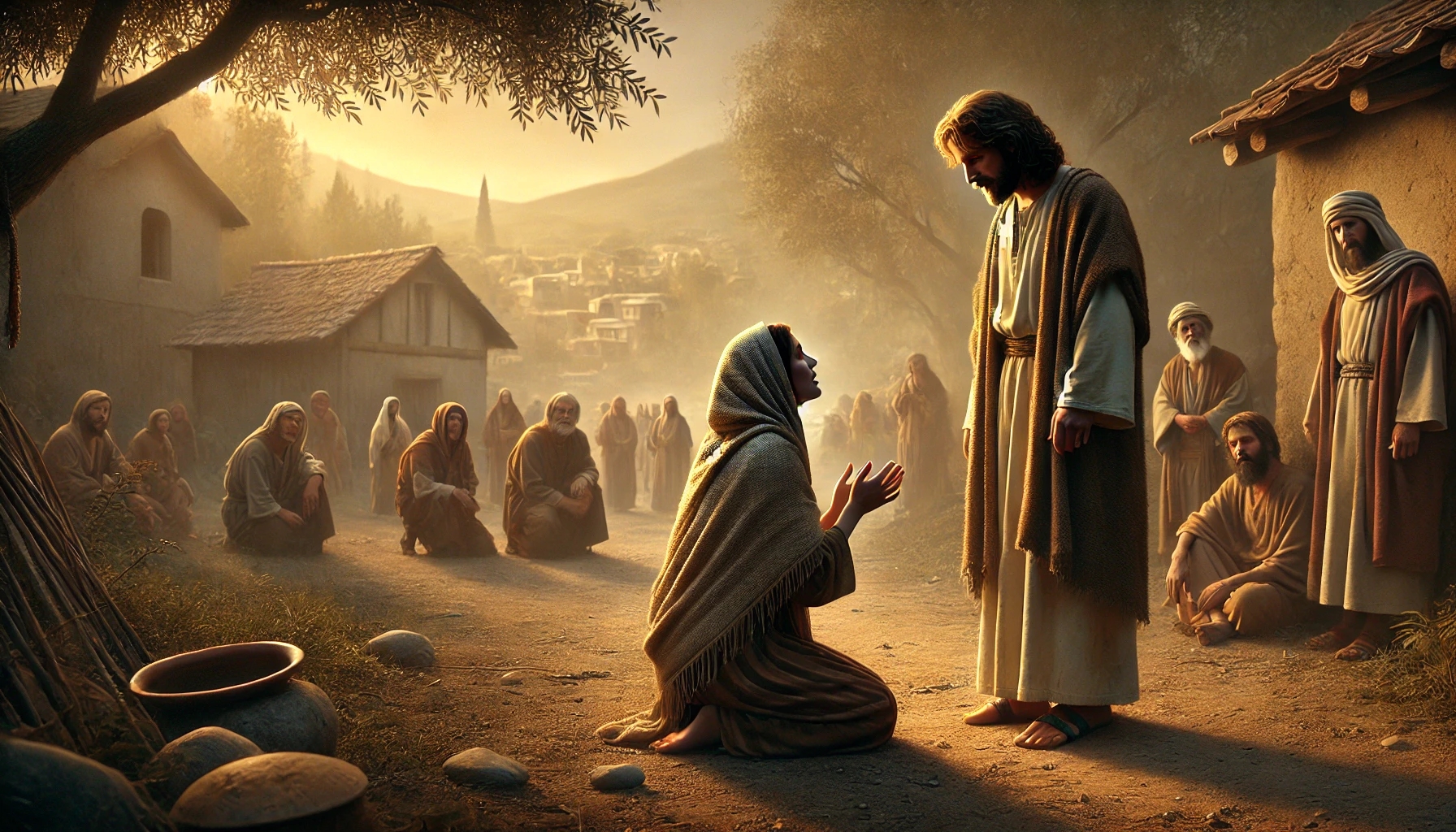
August 13, 2024
DAILY BIBLE READING – Matthew Chapter 14
1 At that time Herod the tetrarch heard of the fame of Jesus,
2 And said unto his servants, This is John the Baptist; he is risen from the dead; and therefore mighty works do shew forth themselves in him.
3 For Herod had laid hold on John, and bound him, and put him in prison for Herodias’ sake, his brother Philip’s wife.
4 For John said unto him, It is not lawful for thee to have her.
5 And when he would have put him to death, he feared the multitude, because they counted him as a prophet.
6 But when Herod’s birthday was kept, the daughter of Herodias danced before them, and pleased Herod.
7 Whereupon he promised with an oath to give her whatsoever she would ask.
8 And she, being before instructed of her mother, said, Give me here John Baptist’s head in a charger.
9 And the king was sorry: nevertheless for the oath’s sake, and them which sat with him at meat, he commanded it to be given her.
10 And he sent, and beheaded John in the prison.
11 And his head was brought in a charger, and given to the damsel: and she brought it to her mother.
12 And his disciples came, and took up the body, and buried it, and went and told Jesus.
13 When Jesus heard of it, he departed thence by ship into a desert place apart: and when the people had heard thereof, they followed him on foot out of the cities.
14 And Jesus went forth, and saw a great multitude, and was moved with compassion toward them, and he healed their sick.
15 And when it was evening, his disciples came to him, saying, This is a desert place, and the time is now past; send the multitude away, that they may go into the villages, and buy themselves victuals.
16 But Jesus said unto them, They need not depart; give ye them to eat.
17 And they say unto him, We have here but five loaves, and two fishes.
18 He said, Bring them hither to me.
19 And he commanded the multitude to sit down on the grass, and took the five loaves, and the two fishes, and looking up to heaven, he blessed, and brake, and gave the loaves to his disciples, and the disciples to the multitude.
20 And they did all eat, and were filled: and they took up of the fragments that remained twelve baskets full.
21 And they that had eaten were about five thousand men, beside women and children.
22 And straightway Jesus constrained his disciples to get into a ship, and to go before him unto the other side, while he sent the multitudes away.
23 And when he had sent the multitudes away, he went up into a mountain apart to pray: and when the evening was come, he was there alone.
24 But the ship was now in the midst of the sea, tossed with waves: for the wind was contrary.
25 And in the fourth watch of the night Jesus went unto them, walking on the sea.
26 And when the disciples saw him walking on the sea, they were troubled, saying, It is a spirit; and they cried out for fear.
27 But straightway Jesus spake unto them, saying, Be of good cheer; it is I; be not afraid.
28 And Peter answered him and said, Lord, if it be thou, bid me come unto thee on the water.
29 And he said, Come. And when Peter was come down out of the ship, he walked on the water, to go to Jesus.
30 But when he saw the wind boisterous, he was afraid; and beginning to sink, he cried, saying, Lord, save me.
31 And immediately Jesus stretched forth his hand, and caught him, and said unto him, O thou of little faith, wherefore didst thou doubt?
32 And when they were come into the ship, the wind ceased.
33 Then they that were in the ship came and worshipped him, saying, Of a truth thou art the Son of God.
34 And when they were gone over, they came into the land of Gennesaret.
35 And when the men of that place had knowledge of him, they sent out into all that country round about, and brought unto him all that were diseased;
36 And besought him that they might only touch the hem of his garment: and as many as touched were made perfectly whole.
King James Version. Public Domain
Commentary
Introduction:
Matthew Chapter 15 addresses central questions of purity and faith, which concern both Jewish law and Jesus’ universal message. In this chapter, Jesus encounters both the Pharisees and scribes, who defend religious traditions, and a Gentile woman, whose faith Jesus admires. Through miracles and teachings, Jesus clarifies the true meaning of purity and the breadth of divine mercy.
Commentary:
On Purity and Impurity (Verses 1-20):
In this section, Jesus is challenged by the Pharisees and scribes, who accuse him of his disciples not following the ritual hand-washing rules. Jesus seizes this opportunity to question the priorities of the religious elite. He shows that they neglect God’s command in favor of human traditions. He quotes the prophet Isaiah to expose their hypocrisy: they honor God with their lips, but their hearts are far from Him. Jesus emphasizes that true impurity does not come from external rituals but from evil thoughts and actions that come from the heart. This represents a radical shift from external legal adherence to inner moral integrity.
The Canaanite Woman (Verses 21-28):
In this remarkable section, Jesus encounters a Canaanite woman who desperately asks for healing for her demon-possessed daughter. Although Jesus initially hesitates and says that his mission is limited to the “lost sheep of the house of Israel,” the woman shows remarkable persistence and humility. She accepts Jesus’ apparent rejection but remains firm in her belief that He can also help her. Jesus is so impressed by her faith that He grants her request and heals her daughter. This encounter highlights the universal reach of Jesus’ message and the power of faith, regardless of ethnic or religious boundaries.
Further Healings and the Feeding of the Four Thousand (Verses 29-39):
After the encounter with the Canaanite woman, Jesus again demonstrates His power through a series of healings and the miracle of feeding the four thousand. These acts reflect Jesus’ compassion for suffering people and affirm His divine authority. Notably, this miracle parallels the earlier feeding of the five thousand, with four thousand men, excluding women and children, being fed with seven loaves and a few fish. These miracles highlight that Jesus’ provision is abundant and His grace knows no bounds.
Summary:
Matthew Chapter 15 sheds light on Jesus’ profound spiritual teaching, which puts external rituals in the shadow and brings the state of the heart to the forefront. It shows how Jesus breaks through the narrow confines of Jewish law and praises faith beyond ethnic and cultural barriers. The encounter with the Canaanite woman demonstrates the power of faith and the extent of God’s grace, while the miracles of healing and feeding reveal Jesus’ boundless compassion and His ability to meet people’s needs. This chapter challenges readers to examine the purity of their hearts and recognize faith as the key to divine grace.
![]()

WEEKLY SPIRIT OF PROPHECY READING – Ellen White | The Desire of Ages Chapter 54—The Good Samaritan
This chapter is based on Luke 10:25-37.
Read online here
Commentary
Introduction
Chapter 54 of “The Life of Jesus” delves into the Parable of the Good Samaritan, a story that conveys profound lessons about true religion and neighborly love. Jesus uses this parable to emphasize the importance of compassion and practical love, which go beyond mere formalism. It demonstrates that the true expression of faith lies in the willingness to help others, regardless of their cultural or religious differences. In a time when self-righteousness and exclusion were prevalent, Jesus places the commandment of love above all other commandments.
Commentary
The Parable of the Good Samaritan is one of Jesus’ most profound and instructive parables, revealing the essence of true religion. It is not about outward rituals or formal religious practices, but about the active exercise of love, compassion, and mercy towards others, regardless of their background, faith, or social status. Jesus uses this story to expose the hypocritical attitude of the religious leaders of his time and to highlight the central importance of neighborly love.
The Good Samaritan represents the contrast between theoretical religiosity and practical, living love for one’s neighbor. While the priest and the Levite—religious authorities—pass by the injured man, it is the Samaritan, an outsider, who demonstrates true divine mercy. The parable underscores that true piety is not about distancing oneself from others but about caring for those in need and standing by them in their distress.
Through this parable, Jesus challenges his listeners and all believers to live out God’s love not just in words but in actions. He shows that a true neighbor is not just someone close to us, but anyone who needs our help. This teaching is a call to break down barriers of prejudice and self-righteousness and to cultivate an attitude of impartial mercy.
Summary
The Parable of the Good Samaritan powerfully illustrates the necessity of placing love for one’s neighbor and mercy above formal religious practices. Jesus makes it clear that true religion is not in the mere observance of rituals but in actively helping those in need. The Samaritan, who shows compassion despite cultural hostility, serves as a model of genuine divine love. The parable challenges us to break down barriers and see every person as our neighbor, whom we can help. This teaching remains a timeless reminder that love for God and our neighbor is the essence of the law and the life of faith.

WEEKLY SPIRIT OF PROPHECY READING – Ellen White | The Desire of Ages Chapter 55—Not With Outward Show
This chapter is based on Luke 17:20-22.
Read online here
Commentary
Chapter 55 focuses on Jesus’ central message that the Kingdom of God is not manifested through outward signs or worldly power, but rather begins within the individual. This teaching sharply contrasted with the expectations of the Pharisees and many Jews, who were anticipating a visible, earthly kingdom. Jesus emphasized that the Kingdom of God is a spiritual state that grows in the hearts of believers, independent of external circumstances or worldly forms of government.
Jesus taught his disciples that the true glory of his mission does not lie in worldly splendor, but in the spiritual renewal of individuals through the Holy Spirit. It was only after his ascension and the outpouring of the Holy Spirit that the disciples fully grasped the scope of Jesus’ mission. They came to understand that Christ’s kingdom is not established through earthly laws or power structures, but through the transformation of the heart and the following of Christ.
This message remains relevant today: the Kingdom of God is not built through political power or external reforms, but through inner renewal and living according to the teachings of Christ. Believers are called to seek not worldly glory, but to walk in humility and self-denial, following the path of Christ, who brought true light and life into the world.
(Visited 13 times, 1 visits today)

